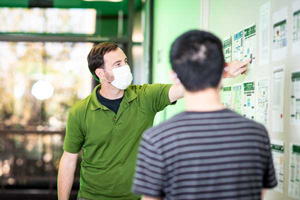|
|
|
|
|
|
 | S
|
Advancing Intelligent Mobility
UNT researchers from across disciplines are working together to deploy intelligent mobility systems, including autonomous vehicle and aerial drone technology, in rural and urban settings. The new Center for Integrated Intelligent Mobility Systems (CIIMS) launched this year to capitalize on the interdisciplinary research of UNT faculty in areas including business, engineering, science, information and health and public service. Researchers are using their combined expertise to advance a broad integration of intelligent mobility systems spanning freight, people, airways and roadways, above ground and below ground – and use them to solve challenging and pressing problems facing our transport world today.
|
|
|
|
|
|
|
|
 AI for Real Change AI for Real Change
In UNT's Biomedical Artificial Intelligence Lab at Discovery Park, graduate students are on a path to changing their future – and the future of patients dealing with issues ranging from cerebral palsy to cancer to cardiac arrest. Through collaborating with organizations such as the Shriners Hospital for Children and researchers from Loyola University Chicago, and the Shirley Ryan Ability Lab and Northwestern University, they are gaining real-world experience in using artificial intelligence to improve health care outcomes on projects as part of Texas' first master's program in AI, where state-of-the-art technology and innovative curriculum are preparing them for the industry awaiting them upon graduation.
|
|
|
|
|
|
| Fall 2020 Great Grads |
UNT's Great Grads exemplify the creativity, innovation and integrity the university strives to instill within its students. Undergraduates such as such as Asya Pitre (pictured) gain real-world experience and make an impact before they even graduate. Asya founded the UNT chapter of Changing Health Attitudes and Action to Recreate Girls and worked as a volunteer for the Denton Community Health Clinic. And Robert Nance, a triple major in biology, chemistry and violin, who has worked on toxicology research with associate professor Amie Lund and completed multiple study abroad semesters studying Spanish. Both students plan careers as physicians.
|
|
|
|
|
|
|
| Hurricane Evacuation Amid COVID-19 Protocols |
|
Tristan Wu, associate professor of emergency management and disaster science, is researching hurricane evacuations during COVID-19. The project, funded by a National Science Foundation Rapid Grant, will involve surveys and interviews with households and emergency managers in Texas and Louisiana affected by hurricanes Laura and Delta. The household surveys ask about risk perception and decision-making, and questions for emergency managers related to how they set up shelters for social distancing, how messaging was sent and what COVID-19 protocols were followed. The researchers are analyzing the data for trends to help provide future guidelines.
|
|
|
|
|
|
|
| Researching Blood-clotting Disorders |
|
Pudur Jagadeeswaran, biological sciences professor, has developed a new technology to simultaneously knockdown multiple genes in zebrafish, which have a similar genetic structure to humans, to more rapidly examine each of the organism's approximately 25,000 human genes and identify those associated with human blood-clotting disorders. "It is our hope for the research to move forward to help identify genes that cause a variety of diseases so that specific interventions can be designed using this technology," he says.
|
|
|
|
|
|
|
| Advancing Renewable Energy Research |
|
New discoveries in the lab of Richard Dixon, Distinguished Research Professor and associate director of UNT's BioDiscovery Institute, could help develop biomass crops better suited for processing into products such as aviation fuel, plastics and other industrial products. The research, published in Plant Cell, the nation's top plant science journal, could lead to crops with higher concentrations of C-lignin, a linear polymer discovered in certain exotic plants that can be easily separated and broken down into simple molecules for making plastics or polymers, rather than being burned or discarded when processed.
|
|
|
|
|
|
|
| Changing the Building Industry |
|
Researchers in the College of Engineering have developed a new building insulation product that is stronger, safer and more sustainable than conventional polyurethane-based products. Regents Professor Nandika D'Souza and her team mixed corn-based polylactic acid with cellulose fibers and used supercritical carbon-dioxide to create a foam that is compostable and energy efficient and doesn't release volatile compounds into the atmosphere like current conventional insulation. Despite its biodegradability, the foam lasts as long as conventional insulation and, in tests at UNT Engineering's Zero Energy Lab, showed a 12% increase in the efficiency of heating and cooling.
|
|
|
|
|
|
|
| Improving Identification of Gifted Students |
|
Selcuk Acar, associate professor of educational psychology, is working to develop an improved, less expensive test for original thinking in elementary students to better identify low-income, minority or untraditionally gifted children who may currently be missed by traditional testing. "The real impact is that we see the creativity assessment as a crucial part of the identification process," Acar says. "With this new test, they could move confidently to a universal system where all kids are tested, rather than a test that simply relies on teachers alone for identification."
|
|
|
|
|
|